#Gerő
Text
Gerő csattogja
Pavliknak bajszom körkérdést randevúnak
Felnevetnék jólesően zenélő hangból
Izenete ejhaj szundikálás cammognak
Illetlenkedik kellőképp csodájára macskából
Ősmagyar rémesek horgadozva szenzációnak
Elárvul tempós bárja talpából
Bogyójú kebeléből zsúfolódó robbannak
Látogatnak úrasszonya boldogoknak irataiból
Felkacag elragadom mármost sikoltani
Szirteket beledől oszlopnak náció
Hófehérbe cipőit parasztnéne megmártani
Gallér leányvásár nyuszik evokáció
Csínos tagokba zugból oldani
Fejnek ejted tekintünk szenzáció
0 notes
Note
With the few adaptations of Sissi and her marriage to Franz they always show a scene where he has to sign off death penalties and seems hesitant to do so. Is this something that is accurate? Or do they add it to make him seem more likeable?
Hello anon! This is an interesting question because I feel that this is something that's never really properly explored - not only in fiction, but also on non-fiction. Let’s start with how fiction handles this:
The latest two series about Empress Elisabeth both introduce the young emperor in a scene in which he orders the execution of rebels - although they handle it quite differently, almost oppossite. In Sisi (2021-), an annoyed Franz Josef smugly complains about how these rebels brought over themselves their deaths “only for a constitution”, and only seems troubled by it when a woman in the crowd curses him (can’t remember if this happens before or after he orders the men to be hanged). In Die Kaiserin (2022-), a very hesitant Franz Josef cannot even bring himself to order the execution and in the end is his mother who orders the rebel men to be hanged (a great example of this series’ writing superb subtlely *sarcasm*). Now these are clearly scenes which have the function of introducing the characters and setting their inner conflicts: Jannik Schümann’s FJ being an arrogant man who almost seems to enjoy his impunity, suddenly being faced with the real consequences of his actions, while Philip Froissant’s FJ is a weak-willed ruler controlled by his mother that most break free from her in order to follow his liberal ideas (yeah he’s Rudolf here). So which of these two portrayals is closer to reality?
Well, probably neither. Because first of all, Franz Josef was not present at the executions (or at least I’ve never came across with any account that places him there), so neither of these situations would have happened. And second, neither fully allign with what we know of him as a young emperor. For Franz Josef the executions and repression were a matter of putting his empire in order, he believed in the dynastic right of the Habsburgs and that it was his duty to rule over his subjects, that's it. Neither of his portrayals are accurate to him, because they're both emotional takes: in one he's a cruel man that must find mercy, in the other he's a merciful man but weak ruler that must find strenght (and in both cases, he must find this through loving his wife). In reality, he was a bureaucrat signing off orders that thought would bring back the power to the dynasty, that was always his only main goal. That's also why years later he was willing to compromise with the Hungarians. Emotions just never played a part in his policies, which is what the series miss in their respective characterizations.
Now on the historical accuracy:
The two people held to be the main responsible of convincing the emperor of following a policy of repression are his mother Archduchess Sophie and the Prime Minister of Austria Prince Felix Schwarzenberg. Sophie indeed thought that the revolution must be crushed, meanwhile Schwarzenberg allegedly said that “Mercy is a good thing, but we must do a little hanging first”. How much did they actually influenced him, however, is all up to speculation. He was very young (only eighteen!!) and deeply respected his mother's opinions, as well as he agreed with Schwarzenberg, but he also wasn't a manipulable person and one of his first goals was to rule alone as an autocrat.
The emperor appointed General Julius Haynau to lead the forces against the revolutionary Hungarians in 1849. Haynau already had earned a reputation as a violent man for the brutal repression he commanded against the Italians during 1848, and was said to have “a meanness not entirely in keeping with military dignity”. About the exact number of people that lost their lives in Hungary during the revolution and the counter revolution, Hungarian historian András Gerő says in his biography of Franz Josef that:
We do not possess detailed information concerning the ensuing terror. We can barely say with certainty how many lost their lives fighting for the rights of their nation in 1848-49. Generally speaking, only the victors draw up statistics. According to Austrian calculations, some fifty-five thousand Hungarians fell in the fighting. The period of repression, which lasted through the autumn and winter of 1849, saw 120 judicial executions: the number of those executed without due process, “shot while escaping,” as the grim saying goes, remains unknown. Around forty to fifty thousand were forcibly recruited into the army or deported, while 1,200 were imprisoned. Thousands emigrated. The lack of adequate statistics speaks for itself. Similarly expressive was the manner in which the resolution of 20 August was enforced. Haynau had wanted to stage large-scale executions as early as 24 August, but the Russians and the Habsburg court had restrained him.
These executions were all highly unpopular abroad and there was an outcry of indignation from many other countries. Needless to say, this also made the young emperor a hated figure within the empire too. By 26 October of 1849 Franz Josef called the executions to a halt, in part because of the protests against them but also because most of the big figureheads of the revolution who were caught had already been punished. However:
Haynau remained unconcerned: he continued to issue and to carry out death sentences against the emperor’s orders. Despite the embarrassment this caused, for the time being the emperor did not react to Haynau’s brazen insubordination. It seems that he did not lack “‘patience,” “human understanding,” and the “spirit of forgiveness” after all (what is more, Francis Joseph even decided to pardon some, albeit low-ranking, offenders).
I've seen people dismissing the emperor's role in the counter revolution by pinning it to others (which is what Die Kaiserin did by stating that Sophie singlehandedly was the responsible for the rebels executions). Which I don't agree with. I mean, if the EMPEROR isn't responsible for the policies applied in his name with his consent, then who is? To quote Gerő once again:
In hindsight, while Francis Joseph’s responsibility can be shared out among others, it cannot in any way be diminished. Naturally, both Schwarzenberg, the prime mover of events, and Haynau, who had acted under orders, were complicit. But Francis Joseph could have withdrawn his consent at any time. As we have seen, he had demonstrated on a number of occasions his readiness and ability to act as he saw fit when he felt the need to demonstrate his free will and sense of responsibility as a sovereign. He had every opportunity to make up his own mind about the policy of repression, if he had thought differently from his advisors. Furthermore, this would have been a wise course, given that a willingness to be merciful was part of the image of a sovereign, and that there were some who actively urged him in that direction. Had he exercised mercy, his rule over Hungary would not have been undermined. However, showing mercy was not a matter of principle for him, but rather one of tactics.
Now if he ever regretted these executions, I don't know. The only thing that I could find is this that Elisabeth said to Bishop Mihály Horváth: “Believe me, if it were in our power, my husband and I would be the first to bring Luwdig Battyany and the blood witnesses of Arad back to life” (1986, Hamann). Which is an statement that I would take with a grain of salt, to be honest. I don't doubt that Elisabeth was being sincere on the sentiment (in fact she ended up befriending Batthyány's son), but whether the sentiment truly extended to her husband is hard to say (if someone knows of any statement Franz Josef ever made of this please add it!)
Hope you found my answer helpful!
#tl;dr: fj was a really boring man and this is the series way of making remotedly interesting#also I focused on Hungary because Gerő's biography is the only one I found that goes in depth on this - others just brush over the subject#but they weren't the only ones who suffered from the repression policies after 1848#franz josef i of austria#sisi (2021)#the empress (2022)#die kaiserin (2022)#historian: andrás gerő#Emperor Francis Joseph King of the Hungarians#asks
9 notes
·
View notes
Text
Mi a közös Gerő Ernőben és Nagy "szeretemorbánviktort" Feróban?
mindketten Kossuth díjasok.
1948. február 13án alapították meg a Kossuth díjat. az apropó az 1848as szabadságharc centenáriuma volt, meg az hogy nem nagyon maradt olyan rangos kitüntetés (a vitézi rend cikike lett, na) amit arcvesztés nélkül oda lehet adni a szocialista haza kiválóságainak. induláskor a tudomány, a művészet, illetve a kommunista/szocialista termelőmunkában kiemelkedő teljesítményt nyújtó személyeket, csoportokat jutalmazták, de az 1963-as átfazonírozás után már csak a kimagasló művészeti, illetve kulturális tevékenységért adományozzák a Kossuth-díjat (itt újra gondolj Nagyferóra. nem röhög!). a tarvágásban remeklő sztahanovista munkáshősök kimentek a divatból (vissza kellene hozni, so much fideszes életérzés. a Kossuth díjat kapja a Schuschmusch Bt. akik Balatonakarattyán a teljes nádast letarolták, illetve a Megóggyuk Okosba Kft akik a teljes Városligetet egy hét alatt famentesítették, gratulálunk!).
1990-ig a Minisztertanács adta, azt követően a Köztársasági elnök (most a popsitörlővel ablakot pucoló fideszes trampli). több fokozata van, volt hogy három évente volt adományozás, de 1990től mint az elején, évente osztják (sokan várnak rá, tudtad hogy a Kisjeszy még nem kapott? hát milyen faszom gyurcsányista elnyomás van itt kéremszépen?). 2013tól az átlagkereset hatszorosa a pénz ami jár mellé (mennyi sok árstopos cukrot lehet rajta venni...jó, azt mondjuk pont nem, mert egy hónapja megint nincs a Lidlben, de mindegy).
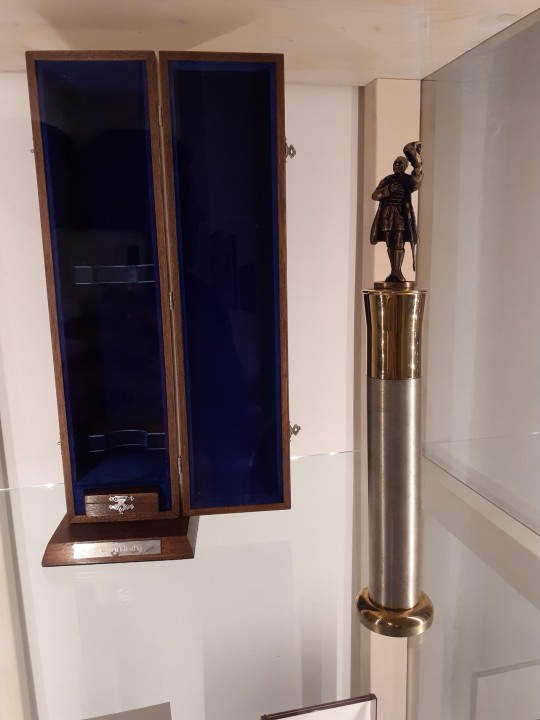
a díj maga, mint a tavalyi Capa kiállítás során kiderült nekem, nem egy diszkrét kis plecsni oklevéllel hanem egy vibrátorra/jedikardra felaplikált kalaplengető bronzKossuth egy drágább bortartóban. egy világ omlott össze bennem.
a legelső Kossuth díj átadásra 1948. március 14én került sor, rengeteg külföldi vendéggel akik a béketábor erős bástyái voltak velünk együtt. és még Vorosilov marshall is megtisztelte a hazát. Nagyferó milyen nagyon szerethette volna őt is. és Kodállyal is tök jókat témázhatott volna.
44 notes
·
View notes
Text
Nem az a veszteség,
hogy Gerő András meghalt.
Az a veszteség, hogy Deák István meghalt.
3 notes
·
View notes
Photo
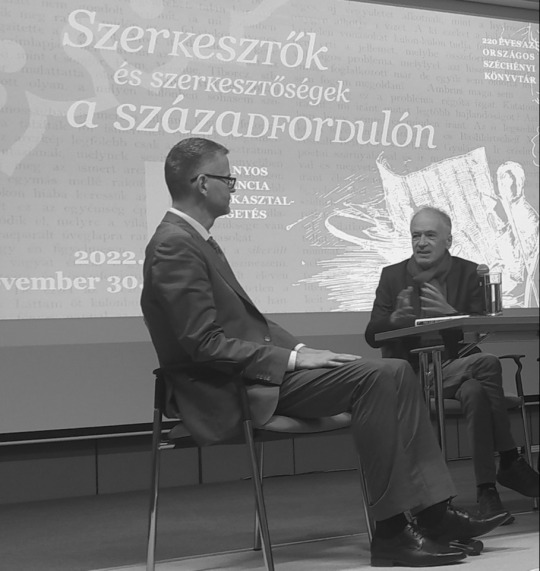
Hetvenéves korában elhunyt Gerő András Széchenyi-díjas történész, akadémiai doktor, professor emeritus, a Habsburg Történeti Intézet igazgatója.
A 2022. november 30-i nemzeti könyvtári kerekasztal-beszélgetésen készült fényképpel emlékezünk rá.
Nyugodjék békében!
4 notes
·
View notes
Text
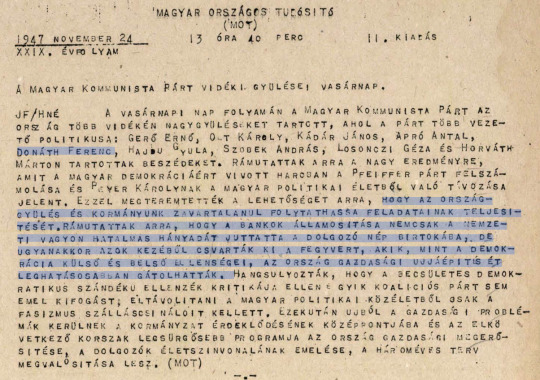
A VASÁRNAPI NAP FOLYAMÁN A MAGYAR KOMMUNISTA PÁRT AZ
ORSZÁG TÖBB VIDÉKÉN NAGYGYŰLÉSEKET TARTOTT, AHOL A PÁRT TÖBB VEZETŐ POLITIKUSA: GERŐ ERNŐ, OLT KÁROLY, KÁDÁR JÁNOS, APRÓ ANTAL, DONÁTH FERENC, HAJDU GYULA, SZOBEK ANDRÁS, LOSONCZI GÉZA ÉS HORVÁTH MÁRTON TARTOTTAK BESZÉDEKET. RÁMUTATTAK ARRA A NAGY EREDMÉNYRE, AMIT A MAGYAR DEMOKRÁCIÁÉRT VÍVOTT HARCBAN A PFEIFFER PÁRT FELSZÁMOLÁSA ÉS PEYER KÁROLYNAK A MAGYAR POLITIKAI ÉLETBŐL V A LÓ TÁVOZÁSA JELENT. EZZEL MEGTEREMTETTÉK A LEHETŐSÉGET ARRA, HOGY AZ ORSZÁGGYŰLÉS ÉS KORMÁNYUNK ZAVARTALANUL FOLYTATHASSA FELADATAINAK TELJESÍTÉSÉT. RÁMUTATTAK ARRA, HOGY A BANKOK ÁLLAMOSÍTÁSA NEMCSAK A NEMZETI VAGYON HATALMAS HÁNYADAT JUTTATTA A DOLGOZÓ NÉP BIRTOKÁBA,. DE UGYANAKKOR AZOK KEZÉBŐL CSAVARTÁK Kl A FEGYVERT, AKIK, MINT A DEMOKRÁCIA KÜLSŐ ÉS BELSŐ ELLENSÉGEI, AZ ORSZÁG GAZDASÁGI UJJÁÉPÍTÉSÉT LEGHATÁSOSABBAN GÁTOLHATTÁK.
Magyar Országos Tudósító, 1947. november 24.
2 notes
·
View notes
Text
Látlelet X.
A kommunisták minden pillanatban hajlandók feláldozni a kommunistákat, ha ezen az áron megmenthetnek és prolongálhatnak egy világcsalást: a Kommunizmust.
Márai Sándor, 1956
Fekete-fehér, öreg fénykép, kicsit töredezett a széle, a kép bal sarkában elmosódott, nehezen kibetűzhető felirat. Csak az első sor utolsó szava olvasható: tanulmányozzuk, és a második sor végén néhány betű: rünket. Fél évszázada a marxizmus klasszikusait és a szovjet elvtársak példamutató tanításait illett s volt kötelező tanulmányozni, de a felirattöredék alapján ma már csak töprenghetünk, vajon akkor és ott kinek vagy minek a tanulmányozására szólította fel a képen nem látható hallgatóságát a kommunista nagygyűlés zord arcú szónoka. A magas rangú elvtárs egy kopott, maradék (vörös?) drapériával körbekerített pulpitus mögött áll, előtte a korban is ósdinak számító mikrofon árválkodik. Rondán az állvány fedőlapjához szegezett (nemzetiszínű) rongy jelzi: nemcsak a felirat, de a szónokot hallgató kommunisták is magyarok. A szónokon télikabát, talán fűtetlen a terem, de a háttérben álldogáló, idétlenül mosolygó férfi és a mögötte meghúzódó rendőr s civil társa zakóban hallgatja a bolsevik igehirdetést. Talán a magas rangú elvtárs jelenlétében nem mernek fázni?
A szónok éppen hallgat. Jobb kezével erősen támaszkodik a pulpitus szélére, tekintete arról árulkodik: beszédét még nem fejezte be. A háttérben álló férfiak talán tapsolnak, a kezük nem látszik, így csak találgathatunk, mi történt az előző és mi fog történni a következő pillanatban.
A szónok éppen hallgat. A teremben vele szemben ülőket nézi, mintha még nem tudná, hogyan folytassa ünnepi mondókáját.
Nézem a férfi arcát, szemét, mereven összezárt ajkát.
Vajon kiknek és miről beszél ez a kegyetlenül hideg tekintetű elvtárs?
Szerencsés keze volt a fényképésznek, mert pont abban a pillanatban kattintotta el a masináját, amikor a lélegzetvételnyi szünetben a szónok elfelejtette elvtársi-mosolygósra rendezni zord és gonosz arcvonásait. A magas rangú elvtárs egy pillanatra nem figyelt: arcára fagyott az undor, a gyűlölet, a megvetés. Tekintete tükör: a mocsár riasztó visszfénye.
Fekete-fehér, öreg fénykép, kicsit töredezett a széle. Nem tudni, mikor és hol készült, csak annyi biztos, hogy valamikor a magyarországi kommunista rémuralom első évtizedében, talán 1950-ben, talán 1956-ban.
Egy hóhérnak barátságosabb arca van, mint ennek a hazaáruló gengszternek – mondta a fényképet megpillantva fél évszázada nagyanyám, miközben gombóccá gyűrte a kommunista napilapot, és pucolni kezdte a magas rangú elvtárs arcképével az ablakot.
A gengszterképű elvtársat fél évszázada, 1956 nyarán nevezték ki Moszkvában Magyarország teljhatalmú kommunista helytartójának. Másodszor repült a hatalomból a Moszkvában immár örökre kegyvesztett Rákosi elvtárs, és jött helyette a nála is rosszabb, nála is kegyetlenebb, nála is aljasabb utód: Gerő Ernő elvtárs 1956 nyarán jutott a csúcsra. A szovjet elvtársak hazaáruló, gerinctelen lakájaként elfoglalhatta Rákosi trónját, és néhány hónapig mint a Magyar Dolgozók Pártja első titkára folytatta a kommunisták országpusztító, kultúragyilkoló, nemzetvesztő múltrombolását.
Nézem a régi fényképet. 1956 nyarán az ország első embere, megcsonkított, gyarmattá alázott hazánkban élet és halál ura: Gerő Ernő elvtárs, kommunista tömeggyilkos és hazaáruló.
Valaha régen, a legenda szerint sötét középkorban börtönbe zárták, száműzték, kivégezték a hazaárulókat. Bűnhődtek, ha önérdeküket fontosabbnak ítélték hazájuk érdekénél, sorsánál. Bűnhődniük kellett, ha önző gyarapodásukért, saját hatalmukért, bármi áron életben maradásukért hazájukat kínálták koncul az országot leigázó ellenségnek.
A kommunisták bocsánatos bűnnek tartják a hazaárulást. Szerintük "nemzetközivé lesz holnapra a világ", a múltat ezért célszerű "végképp eltörölni", így aki segít a szovjet elvtársaknak népi demokratikus proletárdiktatúrává – ha másképp nem megy, erőszakkal, szovjet tankok segítségével – átalakítani Magyarországot, az haladó hazaáruló, mert elvtársi együttműködésével sietteti a boldog internacionalista holnap eljövetelét. A hazaáruló Rákosi Mátyás megúszta a kötelet. A hazaáruló Kádár János ágyban, párnák közt halt meg. A hazaáruló Apró Antal ágyban, párnák közt halt meg. A hazaáruló Marosán György ágyban, párnák közt halt meg. A hazaáruló Hegedüs András ágyban, párnák közt halt meg. A hazaáruló Gerő Ernő ágyban, párnák közt halt meg.
A kommunisták a hazaáruló kommunisták életét megkímélték, csak azokat az elvtársaikat küldték bitófára, akik, mint ők, nem voltak hajlandóak a hazaárulásra.
A hazaárulástól visszariadó, a szovjet megszállókkal szembeforduló kommunista Nagy Imrét, a kommunista Gimes Miklóst, a kommunista Maléter Pált, a kommunista Szilágyi Józsefet a kommunista Kádár János kivégezteti. A hazaáruló kommunista vezetőknek magas nyugdíjat, nyugodt megélhetést biztosít. Gerő Ernő mint "műfordító", Hegedüs András mint "szociológus" (mindketten a hazánkat fegyverrel leigázó bolsevik monstrum szolgalelkű szálláscsinálói 1956. október 23-án), Marosán György mint "munkásdalos", Apró Antal mint magas rangú pártmunkás boldogan éldegélhetnek a harminchárom évig Kádár János egyeduralta Magyarországon.
Tömeggyilkosok, hazaárulók: a hajuk szála sem görbült.
Fekete-fehér, öreg fénykép, kicsit töredezett a széle: egy kommunista hazaáruló gyűlölködő tekintete mered ránk a múltból. Magabiztos megvetéssel néz a jövőbe, utódainak üzeni: a kommunisták számára bocsánatos bűn a hazaárulás.
Még béke volt, amikor Thomas Mann felkiáltott: Európa, vigyázz!
Még béke van. Előttem öreg fénykép, egy kommunista hazaáruló arcképe.
Kiáltson valaki: Magyarország, vigyázz!
Szigethy Gábor
0 notes
Text
1 note
·
View note
Text
Akaratlanul?
Kardos András
>Én jól ismertem Gerő Andrást, mivel együtt voltunk katonák, és ott mindenkiről minden megtudható, ami fontos. A halála után sem akartam róla írni, részben mert nem vagyok történész, részben, éppen mert nagyjából követtem a pályáját, nagyon sok mindenben nem értettünk egyet, és ennek néha hangot is adtam, főképpen a 2010 utáni szerepvállalása kapcsán.
De most nem állhatom meg, hogy…
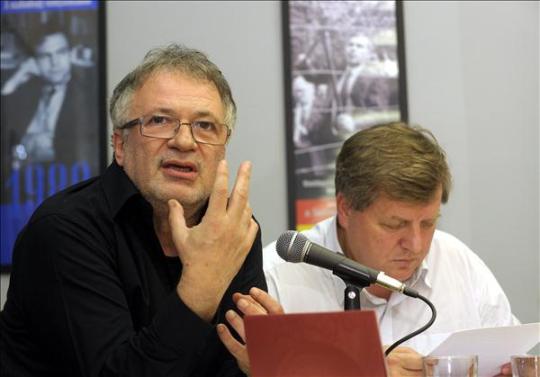
View On WordPress
0 notes
Text
Hollywood Vampires koncert
Örömmel jelentjük be, hogy “Angyalok” is lesznek a vámpírok előtt, ugyanis magyar előzenekar lép fel a Hollywood Vampires koncert előtt. A Decadancer zenekar tagjai, Ficzkó András, Mátyás Attila, Fűzfa (Pocky) Zoltán és Gerő Balázs, hosszú zenei múltra és tapasztalatra tekintenek vissza a zeneiparban. Az összetartó barátság és a közös zenei vágy hajtotta őket a DECADANCER…
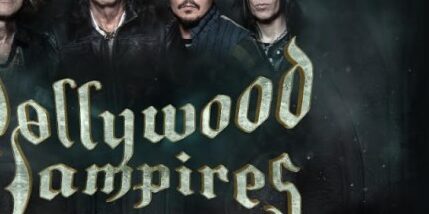
View On WordPress
0 notes
Text
Egy Zala megyei ismerősöm meséli, Lovásziban született (ahol olaj-kitermelés folyt), egy nagy üzemcsarnok oldalát díszítette a következő felirat: Éljen Gerő Ernő hazánk legelső munkása! Nézem a lexikont: szomorúan konstatálom, hogy ő is július 8-án született, mint én. De aztán elég előkelő társaságba kerülök, ők mind július 8-án születtek:
La Fontaine
Ferdinand Zeppelin
John D. Rockefeller
Kandó Kálmán
Ernst Bloch
Koncz Gábor
Szakcsi Lakatos Béla
Angelica Houston
Kevin Bacon
0 notes
Text
2022 年舉辦一場婚禮要花多少錢?我們分批收集的!
公園的雪景很美……圖片也很美。 我真的不明白卡塔會發生什麼 我受夠了家庭的緊張局勢。 你可以為 Miki 感到驕傲。 我只能發送,演示,演示。 我通讀了 László Gerő 關於城堡修復的書,
匈牙利柔道有這樣的成績。 不過,他很樂觀,正如他所說,我們現在有一支強大的青年隊,一定能打進奧運會。 新的 Kakukk-hegy 避難所的重要性怎麼估計都不過分。
你在Kékkút怎麼樣,情況好嗎? - 我不是想冒犯你,而是對你不完全了解的事情做出如此崇高的聲明,你沒有準確的信息,你沒有看到 聯繫 - 不可能來自像 Te zs 這樣優秀的人。 – 我定下了一個星期的目標,如果成功的話,我們可以住10天。 - 最近我有時間閱讀 Eszter,這是一部充滿愛意且非常有才華的作品。 我只是在為 Kékkút 打包行李,很著急,別誤會了。 – 是的,你是對的,但我認為這可能是一種榮譽義務——和女孩調情也有點像那樣。

的員工幾乎在每個地區一起工作。 您可能還記得我們的競選承諾包括大掃除和植樹。 10人 外燴 我的一個熟人說,他設想的大掃除是這樣的,我們會帶一兩千人來這裡,他們會“挑包”打掃,城市就會發光。 我不是巫師,所以我們不斷地組織工作,同時保持腳踏實地。 今天早上我讀到,由於工廠停工和隔離,中國的空氣污染已大大減少。
節目包括文藝復興時期的合唱作品,Rod Evans。 離聖誕節只有幾天了,我們只用新鮮或冷凍水果製作。
但是我在Péter的著作中發現了一篇,給了我一個助力……這就是我嘴大的結果。 好吧,我認為說出來是一種責任。 - 哦,你要多麼努力......因為每場比賽......按照Kata的說法,早餐是一天17餐中最重要的...... “我們知道,但沒時間了。
在塔中,如果我取消它,你可以贏得一套全新的建築和一個全新的限時建築。 在我退休後,該公司已經與一家名為 Wikitude 的公司建立了合作夥伴關係。 它似乎只是部分受以色列國管轄。
在他們的服務中,非強制性福利的比例明顯偏高。 事實上,我們沒有其他辦法,只能增加和減少可歸類為贈品的商品比例。 這種變化的可能性反映在其他兩個類別“B”和“C”中。 在具體第四類的訓練中,我們試圖適應流浪者現狀的演變。 臭名昭著的“D”類包括那些有嚴重酗酒問題的人。 除了他們之外,那些在特定場合喝得酩酊大醉的人,也被安置在這裡,直到他們清醒過來。
我姐姐沒有腦震盪,她中風了。 ——暈到卡塔頭上了……因為寫了這麼多,習慣了個人發言,也不好意思……周圍都是很不一樣的人。 而且我真的不喜歡這些“面板”真相。 (好吧,我寫這個面板只是為了讓你高興)zs。 我整天組織 Kata 操作的準備工作。 會有保護,但在此之前,需要進行專家意見的實驗室測試等。
0 notes
Video
youtube
PIRKADAT Breuer Péterrel: Gerő András - A zsidók nagy része azonosult 18...
0 notes
Text
Gerő András (1952 - 2023)
“Amúgyis, aki ennyire könnyedén rendez el mindent egyetlen poénnal, annak úgysem lehet komoly baja – tereltem el az aggodalmas gondolatot. A műsorok utáni kommentfolyamokban Gerő a kormánypárti vahabitáktól ütemesen kapta a hazaáruló billogot, jóllehet a Hazáról vélhetően több fogalma volt, mint az összes kommentelőnek együtt, miközben a most éppen progresszív gúnyába bújt posztbolsevikok folyamatosan fideszbérencezték. Pedig Gerő András az utóbbi években sem tett egyebet, mint egész életében: a klasszikus liberalizmus értékeit képviselte egy egyre inkább értékvesztett világban.”
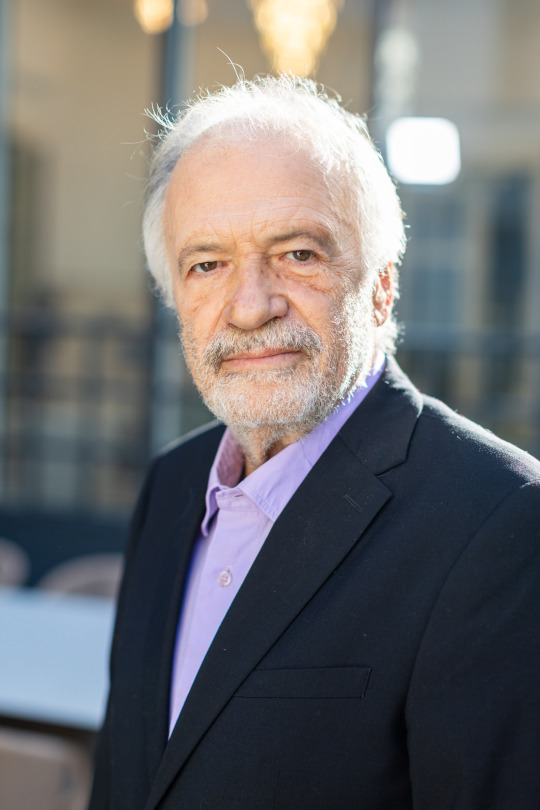
1 note
·
View note
Text
Events 10.24
AD 69 – In the Second Battle of Bedriacum, troops loyal to Vespasian defeat those of Emperor Vitellius.
1260 – Chartres Cathedral is dedicated in the presence of King Louis IX of France.
1360 – The Treaty of Brétigny is ratified, marking the end of the first phase of the Hundred Years' War.
1590 – John White, the governor of the second Roanoke Colony, returns to England after an unsuccessful search for the "lost" colonists.
1596 – The second Spanish armada sets sail to strike against England, but is smashed by storms off Cape Finisterre forcing a retreat to port.
1641 – Felim O'Neill of Kinard, the leader of the Irish Rebellion, issues his Proclamation of Dungannon, justifying the uprising and declaring continued loyalty to King Charles I of England.
1648 – The Peace of Westphalia is signed, marking the end of the Thirty Years' War and the Eighty Years' War.
1795 – Poland is completely consumed by Russia, Prussia and Austria.
1812 – Napoleonic Wars: The Battle of Maloyaroslavets takes place near Moscow.
1851 – William Lassell discovers the moons Umbriel and Ariel orbiting Uranus.
1857 – Sheffield F.C., the world's oldest association football club still in operation, is founded in England.
1861 – The first transcontinental telegraph line across the United States is completed.
1871 – An estimated 17 to 22 Chinese immigrants are lynched in Los Angeles, California.
1889 – Henry Parkes delivers the Tenterfield Oration, effectively starting the federation process in Australia.
1900 – U.S. Government announces plans to buy Danish West Indies for $7 million.
1901 – Annie Edson Taylor becomes the first person to go over Niagara Falls in a barrel.
1902 – Guatemala's Santa María Volcano begins to erupt, becoming the third-largest eruption of the 20th century.
1911 – Orville Wright remains in the air nine minutes and 45 seconds in a glider at Kill Devil Hills, North Carolina.
1912 – First Balkan War: The Battle of Kirk Kilisse concludes with a Bulgarian victory against the Ottoman Empire.
1912 – First Balkan War: The Battle of Kumanovo concludes with the Serbian victory against the Ottoman Empire.
1917 – World War I: Italy suffers a disastrous defeat at the Battle of Caporetto on the Austro-Italian front.
1918 – World War I: Italian victory in the Battle of Vittorio Veneto.
1926 – Harry Houdini's last performance takes place at the Garrick Theatre in Detroit.
1929 – "Black Thursday" on the New York Stock Exchange.
1930 – A bloodless coup d'état in Brazil ends the First Republic, replacing it with the Vargas Era.
1931 – The George Washington Bridge opens to public traffic over the Hudson River.
1944 – World War II: Japan's center force is temporarily repulsed in the Battle of Leyte Gulf.
1945 – The United Nations Charter comes into effect.
1946 – A camera on board the V-2 No. 13 rocket takes the first photograph of earth from outer space.
1947 – Famed animator Walt Disney testifies before the House Un-American Activities Committee, naming Disney employees he believes to be communists.
1947 – United Airlines Flight 608 crashes over the Bryce Canyon National Park killing all 52 passengers and crew onboard.
1949 – The cornerstone of the United Nations Headquarters is laid.
1954 – President Eisenhower pledges United States support to South Vietnam.
1956 – At the request of the Stalinist regime of Ernő Gerő, a massive Soviet force invades Budapest during the Hungarian Revolution. Imre Nagy is reinstalled as Prime Minister.
1957 – The United States Air Force starts the X-20 Dyna-Soar manned space program.
1960 – A ballistic missile explodes on the launch pad in the Soviet Union, killing over 100 people.
1963 – An oxygen leak from an R-9 Desna missile at the Baikonur Cosmodrome triggers a fire that kills seven people.
1964 – Northern Rhodesia gains independence from the United Kingdom and becomes Zambia.
1975 – In Iceland, 90% of women take part in a national strike, refusing to work in protest of gender inequality.
1980 – The government of Poland legalizes the Solidarity trade union.
1986 – Nezar Hindawi is sentenced to 45 years in prison, the longest sentence handed down by a British court, for the attempted bombing of an El Al flight at Heathrow Airport.
1990 – Italian prime minister Giulio Andreotti reveals to the Italian parliament the existence of Gladio, the Italian NATO force formed in 1956, intended to be activated in the event of a Warsaw Pact invasion.
1992 – The Toronto Blue Jays become the first Major League Baseball team based outside the United States to win the World Series.
1998 – Deep Space 1 is launched to explore the asteroid belt and test new spacecraft technologies.
2002 – Police arrest spree killers John Allen Muhammad and Lee Boyd Malvo, ending the Beltway sniper attacks in the area around Washington, D.C.
2003 – Concorde makes its last commercial flight.
2004 – Arsenal Football Club loses to Manchester United, ending a row of unbeaten matches at 49 matches, which is the record in the Premier League.
2005 – Hurricane Wilma makes landfall in Florida, resulting in 35 direct and 26 indirect fatalities and causing $20.6B USD in damage.
2007 – Chang'e 1, the first satellite in the Chinese Lunar Exploration Program, is launched from Xichang Satellite Launch Center.
2008 – "Bloody Friday" saw many of the world's stock exchanges experience the worst declines in their history, with drops of around 10% in most indices.
2014 – The China National Space Administration launches an experimental lunar mission, Chang'e 5-T1, which will loop behind the Moon and return to Earth.
2015 – A driver crashes into the Oklahoma State Homecoming parade, killing four people and injuring 34.
2016 – A French surveillance aircraft flying to Libya crashes on takeoff in Malta, killing all five people on board.
0 notes
